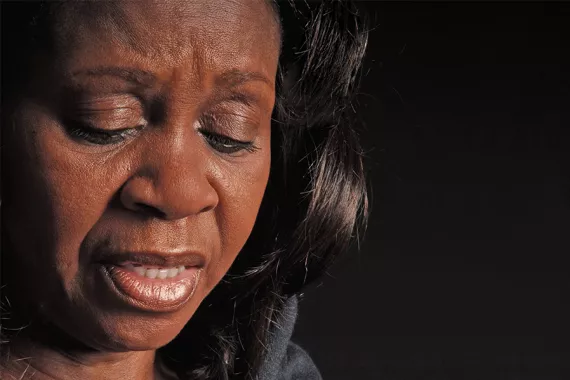
Case Overview
Which hair relaxers may cause cancer is becoming a widespread concern. Manufacturers like L’Oréal, SoftSheen-Carson, Revlon and others currently face lawsuits. These lawsuits claim the companies failed to warn of and didn’t disclose certain harms to product users. Health conditions associated with the toxic chemicals contained in hair relaxers include uterine cancer, endometrial cancer and ovarian cancer.
Key takeaways about which hair relaxers may cause cancer
- Thousands of lawsuits have been filed against hair relaxer manufacturers.
- Black women and women of color have used hair relaxers as a hair straightening tool for generations.
- Research shows using hair relaxers may increase a person’s risk of developing uterine and ovarian cancers. This is due to endocrine-disrupting chemical ingredients in hair relaxer products. This disruption can lead to serious health effects that include cancer.
Do hair relaxers cause cancer?
Hair relaxer products have been linked to the development of uterine cancer, ovarian cancer and endometrial cancer. Several studies have explored this link and found that people who use these chemical straightening products may be at an elevated risk for these cancers. Note that the terms “hair relaxer” and “hair straightener” are often used interchangeably.
A 2022 U.S. National Institutes of Health (NIH) study examined data from women who used hair straightening products more than four times a year. The study found that women who frequently used hair straighteners seemingly doubled their risk of developing uterine cancer over women who didn’t use these products.
Several hair relaxer products include potentially cancer-causing chemicals and chemicals that disrupt the endocrine system, which functions to create and release hormones. Possible endocrine-disrupting chemicals in hair relaxers include di-(2-ethylhexyl), phthalates, parabens, cyclosiloxanes, octamethylcyclotetrasiloxane, lye, formaldehyde and other toxic chemicals.
Additional studies confirm hair relaxer cancer link
Researchers on the Black Women’s Health Study (BWHS) at Boston University found results similar to the NIH study. The BWHS analyzed data of postmenopausal Black women who used hair relaxers frequently. When comparing these women to women who rarely or never used hair relaxers, researchers found the regular users of hair relaxers had a 50% increased risk of uterine cancer. The risk was highest for women who used chemical hair relaxers more than twice a year or for more than five years. Results of the study were published in December 2023.
Another NIH Sister Study looked at the relationship between hair relaxer product use and ovarian cancer. It found those who used hair relaxers or hair straighteners more than four times in a year increased their risk of ovarian cancer by 50%. The products they studied contained endocrine-disruptive chemicals that can be absorbed into the bloodstream. The preliminary findings were published in the journal Carcinogenesis.
The global hair relaxer market size is estimated at nearly $720 million. The global hair care market as a whole is valued at more than $91 billion and is expected to grow to nearly $105 billion by 2028. This market size highlights the vast number of women potentially exposed to these harmful chemicals.
Hair treatments that may contain cancer-causing chemicals
Hair relaxers chemically alter the structure of curly or coily hair to make it straight. These treatments often contain and/or release a host of toxic chemicals such as lye and formaldehyde.
Other hair treatments may also contain harmful chemicals. For example, keratin treatments (which aim to reduce frizz and make hair straighter) and perms (which create semi-permanent curls) have harsh ingredients — similar to hair relaxers. However, these products aren’t part of the hair relaxer/straightener litigation.
Brands involved in allegations about hair relaxers that cause cancer
Lawsuits are currently pending in U.S. District Court for the Northern District of Illinois, Eastern Division against hair relaxer manufacturers. Several hair relaxer manufacturers are named as defendants in the cases.
Products and their manufacturers named in lawsuits include but aren’t limited to:
- Affirm® (Avlon)
- African Pride® (Strength of Nature and Godrej SON Holdings)
- Africa’s Best® (House of Cheatham)
- Cantu® (PDC Brands)
- Crème of Nature® (Revlon)
- Dark & Lovely® (L’Oréal and SoftSheen-Carson)
- Design Essentials® (McBride)
- Dr. Miracle’s (Strength of Nature)
- Dream Kids (Strength of Nature)
- Hawaiian Silky® (JF Labs)
- Just for Me® (Strength of Nature)
- Mizani® (L’Oréal)
- Motions® (Strength of Nature)
- Optimum® (L’Oréal and SoftSheen-Carson)
- ORS Olive Oil® (Dabur and Namaste)
- Pink Conditioning No-Lye Relaxer® (Luster)
- Profectiv Mega Growth® (Strength of Nature)
- Revlon Realistic® (Revlon)
- Silk Elements® (Sally Beauty)
- Smooth Touch No-Lye Relaxer® (Luster)
- Soft & Beautiful® (Strength of Nature)
- TCB® (Strength of Nature)
- TCB Naturals® (Strength of Nature)
What types of cancer are associated with hair relaxers?
Uterine, ovarian and endometrial cancers are associated with frequent use of hair relaxers.
- The same Boston University study mentioned earlier looked at this connection. It compared women who used hair relaxers more than twice a year or for more than five years with women who rarely or never used them. Compared to the women in the second group, the women in the first group were more than 50% more likely to develop uterine cancer.
- A 2022 National Institute of Environmental Health Sciences (NIEHS) study looked at product use versus non-product use. It found that women who frequently used hair straightening products were more than twice as likely to develop uterine cancer. The researchers estimated that about 1.64% of women who never used chemical hair straighteners would develop uterine cancer by age 70. For women who frequently used hair straighteners, that number increased to an estimated 4.05%.
The 2022 NIEHS study also discovered that women diagnosed with endometrial cancer had higher levels of parabens in their endometrial tissue. Parabens are common chemicals found in hair straighteners.
Although these studies didn’t link hair straightener use and cancer risk by race, Black women and women of color predominantly use hair relaxers. As a result, Black and Brown women are at higher risk. In fact, a survey of non-Hispanic Black women found 84% of respondents reported using chemical hair relaxers currently or in the past.
The Environmental Working Group (EWG) analyzed 1,177 items marketed to Black and Brown women. They used their Skin Deep® Cosmetics Database scoring system. In the analysis, they found that about one in 12 products were considered “highly hazardous.”
Do all relaxers cause cancer?
Not all hair relaxers have been tested for cancer-causing chemicals. Some hair relaxer brands may claim that they offer a safe product, free of harsh chemicals. However, there’s no proof that any hair straightener is safe. Much of the debate focuses on traditional lye-based chemical hair relaxers versus non-lye-based hair relaxers. No evidence suggests that non-lye-based hair relaxers are safer than lye-based products.
Some alternative methods to these hair relaxers avoid using chemicals. These methods include wrapping, roller setting and African threading. However, each person’s hair is unique, and what works well for one person may not suit another.
What should I do if I use hair relaxers and have been diagnosed with cancer?
If you currently use or have frequently used hair relaxers and have been diagnosed with cancer, it’s important to make your health your first priority. Consult a medical professional right away to develop a treatment program.
Your next priority could be pursuing financial compensation. You may be eligible to join the litigation currently pending in federal court if you used specific products and were diagnosed with endometrial, ovarian or uterine cancer. These lawsuits have no guaranteed outcome. The hair relaxer litigation is still in the beginning stages.
When this litigation resolves, it could result in compensation for plaintiffs. It could also hold cosmetic and personal care companies accountable for not disclosing the risks of their products.
While no outcome is guaranteed, compensation for hair relaxer injuries could come from a successful plaintiffs’ verdict or a settlement agreement. A hair relaxer lawsuit could assist in covering long-term medical expenses and financial security.
Hair relaxer lawsuit overview
People are suing hair relaxer brands claiming their products may pose cancer risks. Black women and women of color have long-used hair relaxers as a hair straightening tool. Thousands of lawsuits have been filed against hair relaxer manufacturers, alleging companies used chemicals that carry a high risk for causing uterine and ovarian cancer.
An MDL, short for multidistrict litigation, is currently pending in federal court. An MDL combines multiple individual civil lawsuits into one federal district court to make the pre-trial legal process more efficient. Thousands of individual lawsuits, or legal actions, are in MDL No. 3060, which is made up of plaintiffs from multiple states.
As of September 2024, just under 8,500 actions were pending in what’s become one of the largest current MDLs. Allegations include claims that the defendants manufactured, sold, distributed, advertised and promoted toxic hair relaxer products. The cases further allege that the products caused the plaintiffs to develop cancers and other injuries.
Plaintiffs allege they developed serious health conditions like uterine cancer and ovarian cancer after using hair relaxer products. Manufacturers marketed these products overwhelmingly to women and children of color. Complaints state that their marketing exploited social and economic pressures to maintain straight hair but never disclosed dangerous health risks associated with the toxic chemical contained within.
Hair relaxer lawsuit claims
There are multiple claims in the hair relaxer lawsuits. They include:
- Failure to warn: The lawsuits allege the defendants didn’t reveal material safety facts or provide adequate warnings. They also continued to market and sell their products without adequate risk information.
- Breach of warranty: The MDL also alleges a breach of warranty. The lawsuit accuses manufacturers of breaching the Magnuson Moss Warranty Act in two ways. One, the hair relaxer manufacturers didn’t cure damage from use of the products. And two, relaxer products are unfit for ordinary use.
- Design defect: Plaintiffs in hair relaxer lawsuits have alleged that these products were unsafe, defective, and unreasonably dangerous by design. These claims accuse the defendants’ products of causing serious injuries and death from conditions such as uterine and ovarian cancer.
- Negligence: Hair relaxer lawsuits allege that the named manufacturers were negligent in how they created and marketed their products. Plaintiffs say these manufacturers had a duty to exercise reasonable care but failed to act in the best interests of users.
Motley Rice is representing numerous plaintiffs and their families. If you file a hair relaxer lawsuit in the MDL, your lawsuit will name the specific products you used and be filed against the manufacturers responsible for them.
Our hair relaxer lawsuit experience
Our attorneys have extensive experience representing people who have been diagnosed with cancer and other severe health issues after using a toxic product. Through our cases we seek justice for our clients who deserve compensation for their pain and suffering after being misled about the safety of the products they used.
In some of our most recent cases, we’ve represented women harmed by defective Paragard IUDs, women who developed cancer after regularly using talcum powder, and youth and workers who were exposed to lead poisoning resulting from negligence.
Key takeaways
Do hair relaxers cause cancer?
Hair treatments that may contain cancer-causing chemicals
Brands involved in allegations about hair relaxers that cause cancer
What types of cancer are associated with hair relaxers?
What should I do if I use hair relaxers and have been diagnosed with cancer?
Hair relaxer lawsuit overview
Our hair relaxer lawsuit experience
- Sources
- Bertrand K, Delp L, Coogan P, Cozier Y, Lenzy Y, Rosenberg L, Palmer J. Hair relaxer use and risk of uterine cancer in the Black Women’s Health Study. Environmental Research. 2023 Dec 15.239(1):117228.
- Boston University Chobanian & Avedisian School of Medicine: Moderate Use of Hair Relaxers Does Not Increase Breast Cancer Among Black Women.
- Environmental Working Group: Big Market for Black Cosmetics, but Less-Hazardous Choices Limited.
- Judicial Panel on Multidistrict Litigation. Pending MDLs.
- Justia Dockets and Filings: MDL No. 3060.
- Mordor Intelligence. Hair Relaxer Market Size and Share Analysis.
- National Institutes of Health. Hair Straightening Chemicals Associated with Higher Uterine Cancer Risk.
- New York Presbyterian Hospital Health Matters: What to Know about the Connection Between Hair Relaxers and Uterine Cancer.
- Statista. Hair Care Market in the U.S. - Statistics & Facts.
- U.S. Food and Drug Administration. Hair Smoothing Products that Release Formaldehyde when Heated.
- White A, Sandler D, Gaston S, Jackson C, O’Brien K. Use of hair products in relation to ovarian cancer risk. Carcinogenesis. 2021 Oct 5.42(9):1189-1195.
Start Your Motley Rice Consultation in Simple Steps
Submit Information
Call us or fill out our online form with the details of your potential case.
Case Review
Our team reviews your information to assess your potential case.
Case Consultation
Talk with us about next steps.



